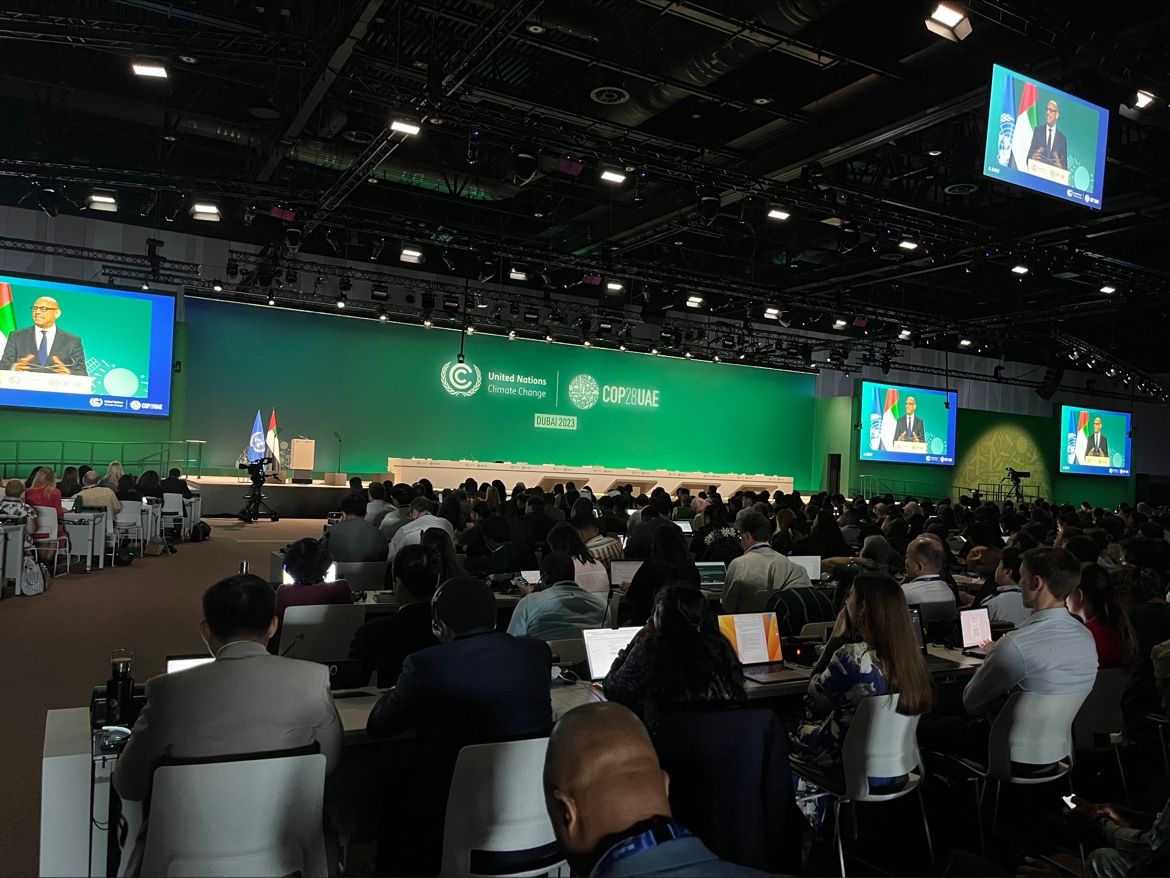The first global UN climate stocktake has resulted in imperfect but unmistakeable momentum on core issues of fossil fuels, renewable energy, energy efficiency, adaptation and climate finance, said the Carbon Market Institute (CMI).
CMI said the failure to advance UNFCCC carbon market architecture for global cooperation in climate investments was unfortunate. However, CMI noted this is not a bar to growing agreements between countries under what is known as Article 6.2 of the Paris Agreement and highlighted advances in transparency, integrity and governance of private sector decarbonisation and crediting.
“This historic COP and its first stocktake under the Paris Agreement has crucially kept alive the goal of limiting warming to 1.5C as the key reference point for reviewing 2030 goals, developing 2035 goals and even updating long term strategies, as flagged by US and China in the concluding plenary,” said John Connor, CEO, CMI.
“It’s not perfect, but there’s unmistakable momentum in the need to transition away from fossil fuels, tripling renewable energy, doubling energy efficiency and embracing other climate solutions, as well as the recognition of the need for greater public and private finance.
“Other developments outside formal negotiations further strengthened the international policy architecture and provided a stronger direction of travel for business and investors. This included the establishment of an end-to-end integrity framework that will create uniform standards in the Voluntary Carbon Market as priority is given to at-source decarbonisation.”
“The outcomes of COP28 must remain a floorboard for action from government and business over the next 12 months. It’s not just about capturing the moment, but also the momentum, and there’s plenty to build on ahead of next year’s meeting in Azerbaijan.”
“Next year’s COP has the task of setting a new goal for climate finance. By then, it’s important that we overcome unfortunate roadblocks that prevented progress at COP28, particularly in realising the greater investment potential under Paris Agreement Article 6.2 and 6.4 carbon market rules.”
“Next year will be crucial in Australia, as our next 2035 target is developed alongside 2050 net zero sectoral plans. We will also be bedding in key reforms to renewable energy, carbon crediting and industrial emissions via the strengthened Safeguard Mechanism,” he said.
Progress against key priorities
Global Stocktake Course Correction Roadmap
“While there are compromises in the final text, the direction of travel is clear, transitioning away from fossil fuels and accelerating investment in other climate solutions including in land management and hard to abate industrial sectors.”
“This COP is the first of five yearly global stocktakes in the Paris Agreement ratchet mechanism which are meant to guide renewed national commitments made two years afterwards. The final decision has emphatically ensured every countries’ commitment due in early 2025 will be tested by how it will help limit warming to 1.5C.”
“Collective global efforts must decrease global emissions by 43% by 2030 and 60% by 2035, with developed countries like Australia doing more, which is why CMI believes Australia needs to aim for reductions of at least 50% by 2030 and 70% by 2035.”
A clear path towards Article 6 carbon market operationalisation and readiness
“COP28 has seen greater support from political and business leaders on the importance of carbon markets as a key source of climate finance and there has been strong progress in integrity initiatives in voluntary markets.”
“However, the formal negotiations in Article 6 carbon markets hit unmoveable roadblocks. The talks failed to agree on common transparency, reporting and crediting authorisation revocation rules in Article 6.2 bilateral agreements for country-to-country investment and credit transfers. They also rebuffed recommendations from a broad-based Supervisory Body to establish Article 6.4 methodologies and carbon removals that could have enabled greater private sector climate investments through UNFCCC backed carbon markets.”
“Sufficient progress was made in previous COPs under Article 6.2 to enable bilateral agreements before, at and after COP28, but these will continue without guidance that could have further boosted investment and transparency.”
“Without progress under Article 6.4, private sector investments not triggered by Article 6.2 agreements will need to refocus on international frameworks for independent verification, compliance frameworks allowing trading like Singapore’s and voluntary corporate action.”
“Fortunately, we saw numerous improvements and commitments made at COP28 that should improve end to end market integrity and governance and allow further and deeper scrutiny of credited climate actions and corporate decarbonisation commitments.”
“The Paris rules could become a benchmark for international quality in the carbon markets, but failure to reach agreements mean that work will have to continue elsewhere for now.”
Outside the formal talks there were initiatives from the United Nations Development Programme (UNDP) and World Bank supporting fair and equitable participation:
- UNDP launched a new initiative at COP28 to support developing countries’ access to carbon markets, mitigate social and environmental risks and promote accurate carbon accounting. Further information is available here.
- The World Bank also announced ambitious plans for the growth of high-integrity global carbon markets, with 15 countries set to earn income from the sale of carbon credits generated from preserving their forests. Further information is available here.
High integrity approaches to corporate and industrial net zero transition
“COP28 saw the launch of a historic collaboration by six of the major independent voluntary standards. The collaboration – which includes the American Carbon Registry, ART (Architecture for REDD+ Transactions), Climate Action Reserve, Global Carbon Council, Verra and Gold Standard – and aims to ‘promote integrity throughout 2024 to create the next step-change in the dependability of carbon markets.”
The groups, all approved under the ICAO Carbon Offsetting and Reduction Scheme for International Aviation (CORSIA), signed a document to:
- undertake collaborative learning and support to strengthen the programs;
- seek alignment on common principles for quantification and accounting;
- jointly pursue permanence and related reversal measures;
- ensure robust benefit sharing and safeguards;
- identify and encourage provision of information round credit use; and
- enable financial flows to developing countries.
“Meanwhile, an important collaboration saw the establishment of an end-to-end integrity framework bringing together key international organisations including the SBTi (Science-based targets Initiative), the VCMI and IC-VCM. These and other groups agreed to provide consistent decarbonisation guidance, including regarding the credible role of carbon credits in corporate transition.”
“This end-to-end framework was backed by a joint statement signed by 17 international powerhouse NGOs including the We Mean Business Coalition, WBCSD, Environmental Defense Fund, The Nature Conservancy and others. The statement emphasises the role of high-integrity, transparent carbon markets as part of broader corporate transition, based on science-based targets and disclosing the use of carbon credits.”
Elsewhere, reforms deepened the international policy architecture guiding global capital and investment with developments including the shared commitment between the International Sustainability Standards Board’s (ISSB) and the International Organization for Standardization (ISO) to improve communication about sustainability-related risks and opportunities.
Scaling up and acceleration of climate finance, including the operationalisation of the Loss & Damage Fund
“The final COP28 decisions recognised the “growing gap’ in financing commitments to developing countries for both mitigation and adaptation and called for steps to address that. It set out steps to next year’s requirement to set important post 2025 climate finance goals highlighting this needs to be inclusive of private as well as public finance.”
“The decisions ‘underscored’ the importance of reforming the multilateral financial architecture, including multilateral development banks. It did successfully establish the Loss and Damage Fund and funding arrangements, but financing for adaptation, as well as loss and damage will need to accelerate.”
Adaptation, nature-based solutions and Just transition work program decision
“The global goal on adaptation agreement calls for a doubling in adaptation finance and plans for assessments and monitoring of adaptation needs in the coming years. There is an explicit requirement for 2030 on water security, ecosystem restoration and health. Additional details on financing expectations and targets are needed at COP29.”
“The decisions included the goal agreed by Australia and others in Glasgow to reverse deforestation by 2030, strengthened linkages with the biodiversity convention and included positive wording on the role played by indigenous communities.”
“The decisions ‘emphasise[d] the importance of conserving, protecting and restoring nature and ecosystems towards achieving the Paris agreement temperature goal, including through enhanced efforts towards halting and reversing deforestation and forest degradation by 2030, and other terrestrial and marine ecosystems acting as sinks and reservoirs of greenhouse gases and by conserving biodiversity, while ensuring social and environmental safeguards, in line with the Kunming-Montreal Global Biodiversity Framework.’”
“To achieve this target, it ‘notes the need for enhanced support and investment, including through financial resources, technology transfer and capacity-building’ and ‘encourages’ implementation based on ‘the best available science as well as Indigenous Peoples’ knowledge and local knowledge systems.’”
“The decisions included some important recognition of the importance of delivering a just transition. The just transition was an important focus in global stocktake, adaptation, climate finance, and implementation agreements. However, more work will be required on what the just transition means in quantitative terms from emissions trajectories to climate finance obligations.”
About the Carbon Market Institute
The Carbon Market Institute (CMI) is a member-based institute accelerating the transition towards a negative emissions, nature positive world. It champions best practice in carbon markets and climate policy, and its 150+ members include primary producers, carbon project developers, Indigenous organisations, legal, technology and advisory services, insurers, banks, investors, corporate entities and emission intensive industries. The positions put forward constitute CMI’s independent view and do not purport to represent any CMI individual, member company, or industry sector.



